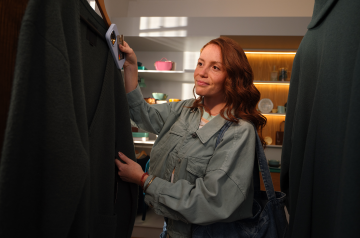
N26 x finance, baby! on how women can take charge of their financial futures
Ready to take charge of your financial future? Teresa (Tessa) Wirth and Denise Haverkamp of finance, baby! share their tips for investing on a budget, must-know financial lingo, and much more.
9 min read
The first step is always the hardest — it’s no wonder many women haven’t thought about how to become financially independent, let alone enter the stock market or start investing. We met with Tessa Wirth and Denise Haverkamp of finance, baby!, who not only shared exciting tips but also talked about their business vision. Founded in 2020, the goal of finance, baby! is to encourage women to take control of their financial future. On their online learning platform for all things finance, Tessa and Denise regularly talk about everyday life situations, success stories, and more. They also use social media to educate women about financial topics and share interesting (and sometimes even shocking!) information about the gender pay gap, unpaid housework, and more. We had the pleasure of interviewing the two founders — and also got their take on what we can do better as a bank when it comes to women and finance. Read on to learn more!
You care deeply about encouraging women to become financially independent. How did you find this calling and what’s your mission for the future?We started finance, baby! for personal reasons. We both had negative experiences and financial problems as children or teenagers. When the pandemic hit and furlough and layoffs suddenly became an issue, we realized that we never really thought about what financial security actually means. We also didn’t have a clue about investing and couldn’t grasp the idea of it at all. However, we also weren’t able to find resources that actually helped us understand finance, as well as enjoy it and stay motivated. This led us to talking to young women between the ages of 20 and 35 years — currently over 300 women — and learning that every single woman we talked to had the same problem. They wanted to change their financial situation but couldn’t find a solution to learn about financial topics in a comprehensible and approachable way. Further research made us understand something even more shocking: One in five women currently receives a pension that is less than €900 per month — and this figure will be even lower for our generation when we start collecting pensions. Women still receive 18% less than men who work in the exact same jobs, and therefore almost 50% less in pension! At the same time, only 13% of the women in Germany follow an investment strategy. The main reason for this is a lack of knowledge and self-confidence when dealing with finances and money. If we don’t try to close this gap and encourage women to secure their retirement, more and more women will slide into old-age poverty — with negative effects for the whole economy. We founded finance, baby! exactly for this reason: We encourage women to take charge of their own financial future. finance, baby! is the place where women can find solutions to the specific financial challenges in their lives.You encourage women on social media to take control of their financial situation. What would you recommend to someone who has never invested before and now wants to learn more about the topic at hand?The beginning is always difficult. That’s why we always recommend finding a person you trust to talk to about money! This is how things started for us. For example, have you ever asked your best friend whether they’re investing and why? Share your thoughts, worries, and specific problems with each other. We all think about money, but we have to start talking about it. It’s the only way to overcome our fears. And if you can’t muster up the courage, talk to us and tell us about your fears in a message, so we can overcome them together.What investment options are there?If you haven’t given the subject much thought before, you might find it pretty abstract at first. For us, the stock exchange had always been something completely remote. However, this isn’t true: Our investments can have a direct impact.For instance, you can invest in a publicly traded company that you believe will rise and succeed, or in one that you really want to support. Investing has many different sides to it. There are investment options that focus on liquidity. These are, for instance, instant access savings accounts or your bank account. Another option are fixed deposit accounts, bonds, or pension funds where you can invest your money at a fixed interest rate. And, as already mentioned, you can invest your money in the capital market, meaning stocks, funds, or certificates. And that’s not all! Even real estate is considered an investment. However, you need to have a little bit more equity for that than for the other options we mentioned. You can also put your money in alternative asset classes, crypto currencies, and of course, natural resources. What are some mistakes to watch out for? What mistakes did you make in the beginning? The magic word for investing always is: diversification! If you want to invest, you should first make a plan and write down your goals. Try not to buy stocks randomly, and don’t put all your eggs in one basket. If the company you invested in is going down, your assets are going along with it. Therefore, make sure to build a diversified portfolio, meaning a broad mix of investments. This way you can minimize your risk. Do you believe that the threshold for women to enter the financial market is higher than for men? There’s one magic word that makes all the difference: entering. That’s what has been made extremely hard for women. Financial products have long been directed at a male target group, using a lot of financial lingo, which can be extremely discouraging for everyone who is new to the topic. Also, due to the gender pay gap, the gender leadership gap, and the motherhood penalty, women have less capital available and therefore hold on to it rather than investing it. This, however, creates a downward spiral: If you don’t invest, you lose money in the long term. Due to inflation, any money you don’t invest increasingly loses its value. And people that believe they are “too poor” to invest and save their money actually end up even poorer. Let’s talk about the ABCs of investing. In your opinion, what are the five most important terms to know before investing?Okay, let’s go! Diversification, portfolio, inflation, risk and, maybe a bit surprisingly, the cost average effect (also called “dollar cost averaging”).I already explained the term diversification above. Your portfolio is actually similar to your bank account — it’s where you “store” your investments in the capital market. Risk isn’t anything negative per se but it’s at the heart of investing, and inflation is the reason why your money gradually decreases in value if you don’t invest it. Let’s talk about the last term in more depth, though, because this is something many of us aren’t aware of: The idea of the cost average effect is that the stock market is volatile only because people attempt to game the markets. This means they try to perfectly time the moment, or entry point, for their investment. And the search for the perfect entry point often leads to a number of bad decisions. The cost average effect aims to eliminate the emotional element of investing, substituting it with a mechanical one. If you want to follow this approach, you don’t have to consider a lot of external factors. You simply have to invest a certain amount of money at a certain point in time every month — no matter what the market conditions currently look like. An important attribute of the cost average effect is timely diversification. Rather than investing your money all at once, you invest your money at different points in time. The greatest benefit of a recurring investment plan is that it prevents investors from making emotional decisions. With this plan, your decision-making won’t be driven by fear and greed, which only lead to irrational decisions and financial loss. Instead, you’ll be guided by an established investment system that spreads out the risk and practically guarantees long-term success.What would you recommend to people that only have a small budget every month? How does a single mom or an underpaid nurse, for instance, manage to provide for their financial future?We suggest looking for expert help — no matter how small the budget. For example, our financial experts Justine and Chiara of DI Frau created our financial plans and matched our pension schemes with our individual budgets. This way, you can make sure you’re not tossing the little money you have out the window, but are really investing it in a smart way. Furthermore, we would always recommend finding out whether there are any support programs available, such as grants or subsidies. In our app, we also provide an overview of these because we really want low-income women to get the support they are eligible for. What could banks like N26 do better when it comes to supporting women in their financial planning and investing?The women that need support the most are probably the ones with the least amount of time on their hands. These are single moms, underpaid caretakers, and so on. This means they need solutions that will save money and time simultaneously and still manage their finances in a smart way. We learned that what helps people the most is actually talking to them. You only know what it feels like to be out in a storm if you’re actually in the boat. And there’s a cost if you don’t do this: Too many founders are in love with their idea but build a solution that no one actually needs. Last but not least: If you had only one financial tip for women, what would it be?Our motto is: Start before you’re ready! No matter if it’s finance or anything else, you will never feel 100% ready to take on something new. You always think you could have learned a little bit more, or that you’re not ready yet to take the plunge. But this point will never come. It’s important to get accurate and thorough information, of course, but then you have to get started! We’re also learning as we go. :) Disclaimer: Shares, ETFs and funds referred to in the article are always subject to risks. Information provided in the article does not constitute any form of investment advice or recommendation to buy or sell securities or other financial instruments. All information provided is for educational and illustrative purposes only and represents exclusively the opinion of the author. None of this information constitutes a recommendation for a particular investment strategy. No liability can be assumed for its correctness. Should the readers adopt the offered contents as their own, make use of any information or follow any opinion referred to in the article, they act at their own risk.
You care deeply about encouraging women to become financially independent. How did you find this calling and what’s your mission for the future?We started finance, baby! for personal reasons. We both had negative experiences and financial problems as children or teenagers. When the pandemic hit and furlough and layoffs suddenly became an issue, we realized that we never really thought about what financial security actually means. We also didn’t have a clue about investing and couldn’t grasp the idea of it at all. However, we also weren’t able to find resources that actually helped us understand finance, as well as enjoy it and stay motivated. This led us to talking to young women between the ages of 20 and 35 years — currently over 300 women — and learning that every single woman we talked to had the same problem. They wanted to change their financial situation but couldn’t find a solution to learn about financial topics in a comprehensible and approachable way. Further research made us understand something even more shocking: One in five women currently receives a pension that is less than €900 per month — and this figure will be even lower for our generation when we start collecting pensions. Women still receive 18% less than men who work in the exact same jobs, and therefore almost 50% less in pension! At the same time, only 13% of the women in Germany follow an investment strategy. The main reason for this is a lack of knowledge and self-confidence when dealing with finances and money. If we don’t try to close this gap and encourage women to secure their retirement, more and more women will slide into old-age poverty — with negative effects for the whole economy. We founded finance, baby! exactly for this reason: We encourage women to take charge of their own financial future. finance, baby! is the place where women can find solutions to the specific financial challenges in their lives.You encourage women on social media to take control of their financial situation. What would you recommend to someone who has never invested before and now wants to learn more about the topic at hand?The beginning is always difficult. That’s why we always recommend finding a person you trust to talk to about money! This is how things started for us. For example, have you ever asked your best friend whether they’re investing and why? Share your thoughts, worries, and specific problems with each other. We all think about money, but we have to start talking about it. It’s the only way to overcome our fears. And if you can’t muster up the courage, talk to us and tell us about your fears in a message, so we can overcome them together.What investment options are there?If you haven’t given the subject much thought before, you might find it pretty abstract at first. For us, the stock exchange had always been something completely remote. However, this isn’t true: Our investments can have a direct impact.For instance, you can invest in a publicly traded company that you believe will rise and succeed, or in one that you really want to support. Investing has many different sides to it. There are investment options that focus on liquidity. These are, for instance, instant access savings accounts or your bank account. Another option are fixed deposit accounts, bonds, or pension funds where you can invest your money at a fixed interest rate. And, as already mentioned, you can invest your money in the capital market, meaning stocks, funds, or certificates. And that’s not all! Even real estate is considered an investment. However, you need to have a little bit more equity for that than for the other options we mentioned. You can also put your money in alternative asset classes, crypto currencies, and of course, natural resources. What are some mistakes to watch out for? What mistakes did you make in the beginning? The magic word for investing always is: diversification! If you want to invest, you should first make a plan and write down your goals. Try not to buy stocks randomly, and don’t put all your eggs in one basket. If the company you invested in is going down, your assets are going along with it. Therefore, make sure to build a diversified portfolio, meaning a broad mix of investments. This way you can minimize your risk. Do you believe that the threshold for women to enter the financial market is higher than for men? There’s one magic word that makes all the difference: entering. That’s what has been made extremely hard for women. Financial products have long been directed at a male target group, using a lot of financial lingo, which can be extremely discouraging for everyone who is new to the topic. Also, due to the gender pay gap, the gender leadership gap, and the motherhood penalty, women have less capital available and therefore hold on to it rather than investing it. This, however, creates a downward spiral: If you don’t invest, you lose money in the long term. Due to inflation, any money you don’t invest increasingly loses its value. And people that believe they are “too poor” to invest and save their money actually end up even poorer. Let’s talk about the ABCs of investing. In your opinion, what are the five most important terms to know before investing?Okay, let’s go! Diversification, portfolio, inflation, risk and, maybe a bit surprisingly, the cost average effect (also called “dollar cost averaging”).I already explained the term diversification above. Your portfolio is actually similar to your bank account — it’s where you “store” your investments in the capital market. Risk isn’t anything negative per se but it’s at the heart of investing, and inflation is the reason why your money gradually decreases in value if you don’t invest it. Let’s talk about the last term in more depth, though, because this is something many of us aren’t aware of: The idea of the cost average effect is that the stock market is volatile only because people attempt to game the markets. This means they try to perfectly time the moment, or entry point, for their investment. And the search for the perfect entry point often leads to a number of bad decisions. The cost average effect aims to eliminate the emotional element of investing, substituting it with a mechanical one. If you want to follow this approach, you don’t have to consider a lot of external factors. You simply have to invest a certain amount of money at a certain point in time every month — no matter what the market conditions currently look like. An important attribute of the cost average effect is timely diversification. Rather than investing your money all at once, you invest your money at different points in time. The greatest benefit of a recurring investment plan is that it prevents investors from making emotional decisions. With this plan, your decision-making won’t be driven by fear and greed, which only lead to irrational decisions and financial loss. Instead, you’ll be guided by an established investment system that spreads out the risk and practically guarantees long-term success.What would you recommend to people that only have a small budget every month? How does a single mom or an underpaid nurse, for instance, manage to provide for their financial future?We suggest looking for expert help — no matter how small the budget. For example, our financial experts Justine and Chiara of DI Frau created our financial plans and matched our pension schemes with our individual budgets. This way, you can make sure you’re not tossing the little money you have out the window, but are really investing it in a smart way. Furthermore, we would always recommend finding out whether there are any support programs available, such as grants or subsidies. In our app, we also provide an overview of these because we really want low-income women to get the support they are eligible for. What could banks like N26 do better when it comes to supporting women in their financial planning and investing?The women that need support the most are probably the ones with the least amount of time on their hands. These are single moms, underpaid caretakers, and so on. This means they need solutions that will save money and time simultaneously and still manage their finances in a smart way. We learned that what helps people the most is actually talking to them. You only know what it feels like to be out in a storm if you’re actually in the boat. And there’s a cost if you don’t do this: Too many founders are in love with their idea but build a solution that no one actually needs. Last but not least: If you had only one financial tip for women, what would it be?Our motto is: Start before you’re ready! No matter if it’s finance or anything else, you will never feel 100% ready to take on something new. You always think you could have learned a little bit more, or that you’re not ready yet to take the plunge. But this point will never come. It’s important to get accurate and thorough information, of course, but then you have to get started! We’re also learning as we go. :) Disclaimer: Shares, ETFs and funds referred to in the article are always subject to risks. Information provided in the article does not constitute any form of investment advice or recommendation to buy or sell securities or other financial instruments. All information provided is for educational and illustrative purposes only and represents exclusively the opinion of the author. None of this information constitutes a recommendation for a particular investment strategy. No liability can be assumed for its correctness. Should the readers adopt the offered contents as their own, make use of any information or follow any opinion referred to in the article, they act at their own risk.
Find similar stories
BY N26Love your bank
Related Post
These might also interest youLIFESTYLEMoney talks: How a 31-year-old data analyst manages their moneyHere’s how a millennial data analyst balances rent, savings, and fun on €3,200 a month.
5 min read
LIFESTYLEEuropeans prioritize daily spending and saving in 2024We surveyed 6,300 Europeans across five countries about their approach to finances.
8 min read
LIFESTYLEHow modern couples manage joint financesWhether you’re polyamorous or monogamous, married with kids or parenting pets, money matters in every relationship. But the way partners organize their finances can differ greatly.
6 min read


